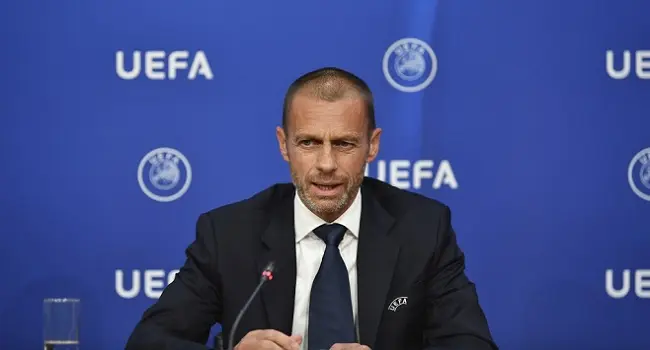
In a world where football and politics often intersect, the ongoing influence of Russia within UEFA, despite international sanctions and bans, presents a complex challenge for the governing body of European football. This influence is a testament to the intricate web of political maneuvering and strategic alliances that continue to shape the landscape of the sport. At the center of this diplomatic tightrope is Aleksander Ceferin, UEFA President, who faces the daunting task of maintaining the integrity of European football while managing geopolitical tensions.
The backdrop to this issue is the ongoing bans imposed on Russia by various international sports organizations. These sanctions are a response to political actions beyond the field, yet they ripple through the footballing world, affecting leagues, clubs, and players. Despite this, Russia's foothold within UEFA remains surprisingly firm, raising questions about the dynamics at play within European football governance.
The Resilient Influence
Russia's influence within UEFA is multifaceted, rooted in a combination of historical ties, strategic partnerships, and economic interests. Historically, Russian football has enjoyed a significant presence in European competitions, with clubs like Zenit Saint Petersburg and CSKA Moscow competing at high levels. Additionally, the Russian Football Union (RFU) has been a longstanding member of UEFA, contributing to various committees and initiatives that shape the organization's policies.
Economically, the Russian market remains an attractive proposition for European football. The financial power of Russian oligarchs has seen substantial investments in European clubs, most notably Chelsea FC, previously owned by Roman Abramovich. These investments not only bolster the clubs’ financial standings but also create a network of influence that extends into UEFA's corridors.
Moreover, UEFA's reliance on sponsorship deals and broadcasting rights, some of which are tied to Russian companies, further complicates the situation. Such financial entanglements make it challenging for UEFA to sever ties completely without risking significant economic repercussions.
Ceferin's Balancing Act
For Aleksander Ceferin, navigating these turbulent waters requires diplomatic finesse. The Guardian reports that Ceferin's tenure has been marked by efforts to maintain unity within UEFA while addressing the broader implications of geopolitical conflicts. His challenge lies in balancing the need for strong ethical governance with the practical realities of the modern football economy, where political and financial interests are deeply intertwined.
Ceferin's approach has been one of cautious engagement, attempting to keep communication channels open with Russian officials while upholding the principles of fair play and justice. This strategy aims to prevent further isolation of Russian football, which could lead to fragmentation within UEFA and potentially weaken the organization's influence.
The Role of UEFA's Member Associations
UEFA's structure, comprising 55 national associations, presents another layer of complexity. These associations hold significant sway in deciding UEFA's policies and actions. The Russian Football Union, despite its current predicament, is part of this collective, and its exclusion could set a precedent that other nations may find concerning.
Member associations from countries with strong political ties to Russia, or those with significant Russian expatriate communities, may advocate for a more lenient approach. Conversely, associations from nations directly affected by Russian political actions may push for stricter sanctions. This dichotomy requires Ceferin to employ a nuanced approach, ensuring that UEFA's decisions are seen as fair and representative of its diverse membership.
The Wider Implications for European Football
The ongoing situation with Russia highlights the broader challenges facing European football governance. As the sport becomes increasingly globalized, the intersection of politics and football will likely become more pronounced. UEFA's handling of the Russian influence can set a precedent for how the organization addresses similar issues in the future.
This scenario calls for a reevaluation of UEFA's governance structures to ensure they are robust enough to withstand political pressures while remaining true to the sport's core values. Transparency, accountability, and a commitment to ethical standards must be at the forefront of UEFA's agenda as it navigates this complex landscape.
Looking Ahead
The future of Russian involvement in UEFA remains uncertain, contingent on the evolving geopolitical landscape and UEFA's internal dynamics. For Aleksander Ceferin and UEFA, the path forward will require a delicate balance of diplomacy and decisiveness.
As UEFA continues to grapple with these challenges, the organization must strive to maintain its credibility and authority within the global football community. This will involve not only addressing the immediate issue of Russian influence but also strengthening its governance frameworks to better handle the intricate interplay of politics and football in the years to come.
In conclusion, the influence of Russia within UEFA serves as a compelling case study of the complexities facing modern football governance. It underscores the need for a strategic, forward-thinking approach that prioritizes the integrity of the sport while acknowledging the realities of a politically charged world. For UEFA, the task is clear: to uphold the principles of fairness and unity, ensuring that football remains a unifying force in a divided world.
